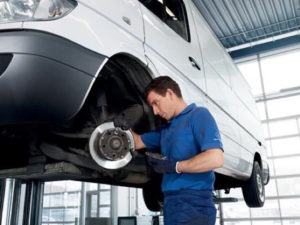The Department for Transport (DfT) has indicated that it will enable the Driver and Vehicle Standards Agency (DVSA) to access MOT test fee income to help pay for enforcement on large vans – but without hiking up the cost of MOTs.

The move, which comes as the DfT confirms it will retain the three-year first MOT for both cars and vans, follows a consultation that saw the DfT and DVSA recommend the funding of enforcement against unsafe vans out on the roads should be transferred from a grant paid for by taxpayers to a fee charged to van operators on top of the MOT fee.
However, the proposal caused some controversy including from members of the FTA, who said the ‘enforcement levy’ should only apply to operators’ vehicles that did not pass their MoT at the first attempt to avoid penalising those operators who maintain their vehicles properly. According to 2015-2016 MOT stats from the DVSA, 46.8% of large vans failed their MOT at the first attempt.
The BVRLA also opposed the proposal and said if such a levy were introduced there must be transparency in how any revenue generated is spent.
In its response to the consultation and summary of responses, the DfT said the proposal for class 7 vehicles (those weighing 3,000- 3,500kg) was generally supported by respondents, adding that as large vans are used for commercial purposes, so it was deemed appropriate to impose costs on those who benefit most.
However, some respondents believed a study should be undertaken first to assess the impact on small firms. Other respondents felt the prospect of an increase in fee for class 7 may put more vehicles on the road without an MOT.
In response, the Government said it will take these views into account when considering how best to administer enforcement costs, and consult as appropriate in due course. It is not taking forward any changes to test fees, but will amend regulations to allow DVSA to use test fee income from light goods vehicles on compliance work relating to these vehicles, as is already the case for large goods vehicles.
Last year’s consultation on possible MOT changes also found respondents were particularly opposed to increasing the first-year exemption on vans, with a clear majority in favour of retaining the three-year rule for all vans in class 4 and class 7. Meanwhile the BVRLA had actually said the date of the first MoT test for larger vans should be brought forward to one year, not pushed back to four.
BVRLA chief executive, Gerry Keaney said: “The BVRLA is pleased to see that the government is listening to industry’s safety concerns, which must always be a primary consideration when making changes to MOT requirements. Although we did not have major concerns about the impact of increasing the first MOT test deadline for cars from three to four years, we did express serious concern about applying this to vans.
“Vehicle safety is of paramount importance and in our consultation response last year we went further by calling upon government to reduce the first MOT requirements for class 7 vans to one year. We also said that we would like to see a targeted increase in van enforcement, aimed at removing non-roadworthy vehicles from UK roads and penalising those operators who flout vehicle safety regulations.”
For more of the latest changes, click here.

